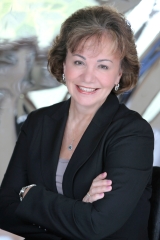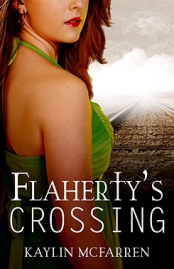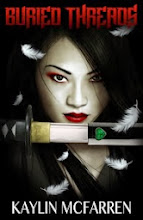Friday, February 26, 2010
The Story Behind Flaherty's Crossing
Over the course of his two and a half year battle, I was given small glimpses into his past. I discovered that my father's inability to communicate had little to do with the affection he kept buried inside. But this cruel disease was aggressive and soon took its toll. Before long, it was time for me to bid him a final farewell. I was not only heartbroken over losing a parent but also for never knowing who this man truly was. As a result, I was angry at him, at God, at the world in general. I needed an outlet to release all my pent up emotions and found it in front of my computer, punching away on keys. This therapeutic exercise gradually evolved into a related fictional story about a woman’s personal journey to find faith and forgiveness.
In the process of writing Flaherty’s Crossing and exploring my main character’s growth, I found myself learning and growing as well. I discovered I wasn't alone. There were thousands of daughters and sons like myself who had similar stories to tell – who had strained, complicated relationships, but loved their parents none the less. I've learned that through my writing, I can inspire and touch lives and can urge others to mend fences and relationships before it's too late. This novel truly has a purpose. Not only did Flaherty's Crossing heal my heart, but I believe the message it carries can make a difference for other families as well. I've chosen to donate 100% of my proceeds to the cancer research center at Portland's Providence Medical Center with the hope of finding a cure in our lifetime. This story has opened my eyes to possibilities and given me a voice that I plan to use in future stories with the intention of inspiring and uplifting lives.
Wednesday, February 17, 2010
Tuesday, February 16, 2010
Kaylin's Interview at Literature & Fiction
February 16, 2010/Interview by shelaghwatkins
Kaylin McFarren is a member of RWA, Rose City Romance Writers, and Willamette Writers. She received her AA in Literature at Highline Community College, which originally sparked her passion for writing. In her free time, she also enjoys giving back to the community through participation and support of various charitable and educational organizations in the Pacific Northwest.
Shelagh: Please tell everyone a little about yourself, Kaylin
 Kaylin: For the past twenty years, I’ve worked in PR and marketing for my family-owned conglomerate, the Yoshida Group, which consists of eighteen diverse corporations. I was appointed as one of nine commissioners to the Oregon Arts Commission by Governor Kitzhaber while working as the director of a nationally-acclaimed art gallery in Portland, Oregon. I’ve also served on numerous college and charity foundation boards, and continue my commitment to hospitals and children’s causes. For most of my life, I’ve written poems and short stories, and along with novels, currently write articles for a syndicated travel magazine. Although Flaherty’s Crossing is my début novel, it has already garnered numerous awards and received recognition as a 2008 Golden Heart® Finalist.
Kaylin: For the past twenty years, I’ve worked in PR and marketing for my family-owned conglomerate, the Yoshida Group, which consists of eighteen diverse corporations. I was appointed as one of nine commissioners to the Oregon Arts Commission by Governor Kitzhaber while working as the director of a nationally-acclaimed art gallery in Portland, Oregon. I’ve also served on numerous college and charity foundation boards, and continue my commitment to hospitals and children’s causes. For most of my life, I’ve written poems and short stories, and along with novels, currently write articles for a syndicated travel magazine. Although Flaherty’s Crossing is my début novel, it has already garnered numerous awards and received recognition as a 2008 Golden Heart® Finalist.
Shelagh: How long have you been writing?
Kaylin: Most of my life. I honestly remember writing poems when I was five years old. I got into short stories when I was in junior high and eventually some of them ended up in my high school newspaper. My interest in writing continued for years but was limited to public relations with an emphasis on press releases and daily correspondence. In regard to novels, although I’ve contemplated penning one for some time now, I’ve actually been writing manuscripts for a relatively short period of time.
Shelagh: What, or who, inspired you to write?
Kaylin: I had a great English teacher in sixth grade, Mrs. Tuttle. I remember her telling the class that we could create a magical world with words. She gave everyone a journal and instructed us to write something in it everyday. To this day, I still fill up journals with my thoughts, poems, and short stories.
Shelagh: Where do you get your ideas for your books?
 Kaylin: When I started Flaherty’s Crossing, it was based on my personal experience – the death of my dad and my emotional journey to acceptance. But after opening myself up to an amazing literary world – reading extensively, doing writing exercises, taking workshops – the door to my imagination was opened. Now days, I literally “dream up” my stories from beginning to end and have had to resort to keeping a notebook on my bedside table.
Kaylin: When I started Flaherty’s Crossing, it was based on my personal experience – the death of my dad and my emotional journey to acceptance. But after opening myself up to an amazing literary world – reading extensively, doing writing exercises, taking workshops – the door to my imagination was opened. Now days, I literally “dream up” my stories from beginning to end and have had to resort to keeping a notebook on my bedside table.
Shelagh: What genres do you write and which is your favorite genre to write?
Kaylin: When I first started writing Flaherty’s Crossing, I had no idea how to define this story. After completing and entering contests, I learned to categorize it as mainstream fiction, involving all kinds of elements: suspense, drama, romance …you name it. But with my second book, I’ve become a bit wiser and made a conscience decision to write action/adventure romance. I believe this is rapidly becoming my forte. I can’t wait to get to the next chapter and to fish my characters out of shark-infested seas.
Shelagh: Can you tell us about your favorite hero and/or heroine in one of your stories?
Kaylin: Drew Coleman in Flaherty’s Crossing is one of my favorite characters. He’s an attractive, middle-aged divorce attorney who has spent most of his life trying to live up to his father’s expectations. In the midst of struggling with his obligations and job responsibilities, Drew’s marriage to Kate Flaherty explodes over trust issues and is left in total disrepair. However, when he learns his wife’s life is at risk, his priorities quickly shift and he discovers where his love and loyalties truly lie.
Shelagh: When you write about a hero/heroine, are there parts of your characters that you take from your own experiences in your life?
Kaylin: I suppose there are. Most definitely in regard to conversations, careers, and relationships. I guess that’s what makes them more believable –three dimensional, you might say.
Shelagh: Do you have favorite props that you use to bolster a story? Why do you use them?
Kaylin: Well, when I was writing Flaherty’s Crossing, I kept my father’s picture close by to remind myself of the kind of person he was. But aside from that, I’d probably say no. That is, if you don’t consider a periodic glass of wine a prop.
Shelagh: When you are writing a book, do the characters become a part of your everyday life? How do you deal with it if they take over your everyday world?
Kaylin: When my characters interact, encounter grave situations, and express their emotions, they become more real to me. I don’t think I’ve had to deal with them taking over my life; although, I do worry about getting them out of trouble if they’re cornered and I’m detained and not able to write for a while.
Shelagh: Do your families encourage you to write?
Kaylin: Absolutely! I think my husband believes I’ve somehow found my identity and purpose in life. As for my children, they’re awesome – asking me all the time how my writing’s going. My oldest daughter is an author as well and she’s constantly spurring me to stay focused and on track.
Shelagh: You have a busy life with a career and family. How do you find time to write? Do you have a schedule?
Kaylin: My children are grown, my husband travels extensively, and I have a great library with lots of peace and quite. This affords me the luxury of writing as much as I like, which could easily involve working from 10am – 10pm. However, my family finds ways to drag me away on family vacations, to movies, and to restaurants just so I don’t completely alienate myself.
Shelagh: If for some reason you could not write anymore, how would you creatively express yourself?
Kaylin: I actually studied visual arts in college and love to oil paint. Guess that’s why I ran an art gallery for seven years. I suppose if I couldn’t write any longer, I’d dig up my old supplies and find a way to paint my stories on canvas.
Shelagh: You have a special project for all of the proceeds from your book, Flaherty’s Crossing. Can you tell us about this?
Kaylin: I’m donating 100% of my proceeds to the cancer research center at Providence Medical Center in my father’s name. There’s information all about the research project I’m funding on my new website: http://www.flahertyscrossing.com
Shelagh: Why did you decide to give all of your proceeds to cancer research?
Kaylin: After witnessing my father’s relentless battle with terminal cancer and his passing at the young age of 64, my emotions were in complete turmoil. I was angry at him for leaving, at God for the suffering he endured, at the world in general for not taking notice. I searched for an outlet – a way to vent my feelings, and was fortunate in finding the resolution I needed by writing Flaherty’s Crossing. In the course of creating this story, I had the opportunity to speak to various individuals who have lost loved ones and came to realize that everyone is somehow affected by this non-discriminating disease. This novel became more than a fictional account. It evolved into a personal journey – one that my father has traveled on right beside me, inspiring and encouraging me all along the way. In order to honor his memory and to do my part to bring an end to this terrible disease in our lifetime, I have chosen to donate all the proceeds from the sale of this book to the cancer research center at Providence Medical Center, and strongly urge anyone who enjoys reading to purchase a copy of Flaherty’s Crossing.
Shelagh: Where can folks learn more about your books and upcoming events?
Kaylin: My websites: http://www.kaylinmcfarren.com http://www.flahertyscrossing.com
Shelagh: Thank you for joining us today, Kaylin.
Kaylin: Thanks, Shelagh!





